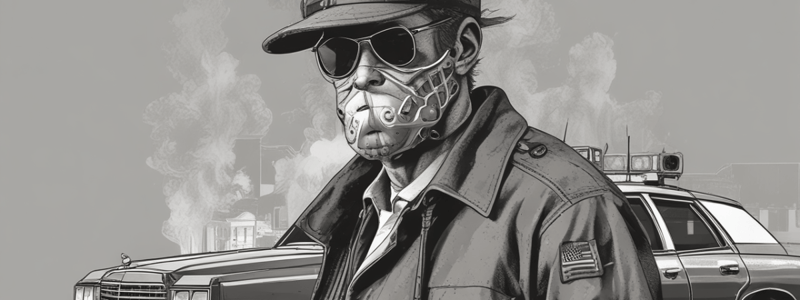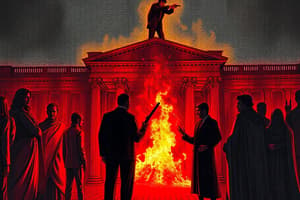Podcast
Questions and Answers
How do Green and Ward (2005) define state crime?
How do Green and Ward (2005) define state crime?
- Any act committed by state officials
- Actions approved by international organizations
- Activities that result in economic loss to the state
- Illegal or deviant activities by or with the complicity of state agencies (correct)
According to Chambliss, what constitutes state crime under domestic law?
According to Chambliss, what constitutes state crime under domestic law?
- Acts defined by law as criminal and committed by state officials in pursuit of their jobs (correct)
- Legally permissible acts that cause harm
- Violations of human rights
- Acts that are illegal internationally
Which example best fits the definition of political crimes as per the content?
Which example best fits the definition of political crimes as per the content?
- Chernobyl Disaster
- Corruption Index by Transparency International (correct)
- Austerity policies
- Institutional Racism
Who argued that the study of crime should focus on harm rather than legality?
Who argued that the study of crime should focus on harm rather than legality?
According to Rothe and Mullins (2008), what characterizes state crime?
According to Rothe and Mullins (2008), what characterizes state crime?
Which of the following is a type of economic crime?
Which of the following is a type of economic crime?
What does Cohen's 'Culture of Denial' model include?
What does Cohen's 'Culture of Denial' model include?
Who calculated that over 169 million people were murdered by governments from 1900-1987, excluding war deaths?
Who calculated that over 169 million people were murdered by governments from 1900-1987, excluding war deaths?
According to the information, which feature is identified as making state crimes difficult to detect and intervene?
According to the information, which feature is identified as making state crimes difficult to detect and intervene?
According to Schwendinger (1975), how should state crime be defined?
According to Schwendinger (1975), how should state crime be defined?
Which thinker's definition of state crime includes both illegal acts and legally permissible acts that cause similar harm?
Which thinker's definition of state crime includes both illegal acts and legally permissible acts that cause similar harm?
Which of the following crimes would be categorized as an economic crime?
Which of the following crimes would be categorized as an economic crime?
According to the Corruption Index, which of the following countries is NOT listed as one of the least corrupt?
According to the Corruption Index, which of the following countries is NOT listed as one of the least corrupt?
What does Cohen's Stage 3 of the Culture of Denial state?
What does Cohen's Stage 3 of the Culture of Denial state?
Which theory by Sykes and Matza involves justifying criminal acts through denial of victims and injury, among other methods?
Which theory by Sykes and Matza involves justifying criminal acts through denial of victims and injury, among other methods?
Which state's actions in 1975-1978 resulted in the death of up to 1/5 of its population due to state crime?
Which state's actions in 1975-1978 resulted in the death of up to 1/5 of its population due to state crime?
What does the term 'zemiology' refer to?
What does the term 'zemiology' refer to?
Which event is an example of 'genocide' as defined in the content provided?
Which event is an example of 'genocide' as defined in the content provided?
Which type of state crime is exemplified by 'ISIS destruction of Churches and shrines in Mosul'?
Which type of state crime is exemplified by 'ISIS destruction of Churches and shrines in Mosul'?
What does the concept of 'national sovereignty' indicate in relation to state crime?
What does the concept of 'national sovereignty' indicate in relation to state crime?
Flashcards are hidden until you start studying
Study Notes
State Crime
Definitions of State Crime
- Green and Ward (2005) define state crime as illegal or deviant activities perpetrated by, or with the complicity of, state agencies.
- Chambliss defines state crime as acts defined by law as criminal and committed by state officials in pursuit of their jobs as representatives of the state.
- Michalowski (1985) includes illegal acts and legally permissible acts whose consequences are similar to those of illegal acts in the harm that they cause.
- Hillyard (2004) proposes replacing the study of crime with zemiology, regardless of whether the act is against the law.
- Rothe and Mullins (2008) define state crime as an action by or on behalf of a state that violates international law and/or a state's own domestic law.
- Schwendinger (1975) views state crime as a violation of people's basic human rights by the state and their agents.
Types of State Crime
- Eugene McLaughlin is a key thinker in this area.
- Political Crimes:
- Censorship or Corruption: Correlation between corruption, war and conflict, and poverty, as seen in the Corruption Index.
- Genocide: Examples include Rwanda (1994), Cambodia (1970s), and Bosnia Herzegovina (1990s).
- Torture, Imprisonment Without Trial, and Disappearance of Dissidents: Examples include Guantanamo Bay, China, Russia, and Saudi Arabia.
- Economic Crimes:
- Official violations of health and safety laws: Examples include the Chernobyl Disaster.
- Economic Policies that cause harm to the population: Examples include austerity.
- Social and Cultural Crimes:
- Institutional Racism: Police force targeting certain groups in society, and Ethnocentric Curriculum ignoring certain groups' history.
- Destruction of native cultures and heritage: Examples include ISIS destruction of Churches and shrines in Mosul, and USA destruction of Native Indian sites and lands.
Seriousness of State Crime
- Scale: States can cause large and powerful, often widespread harm, as seen in the example of Cambodia (1975-1978) where the Khmer Rouge government killed up to 1/5 of the entire population.
- Culture of Denial: Cohen's stages of denial include:
- STAGE 1: 'It didn't happen'.
- STAGE 2: 'If it did happen, it's something else'.
- STAGE 3: 'Even if it is what you say it is, it's justified'.
- State as a source of Law: States have the power to conceal their crimes and make them harder to detect, and change the law to benefit their deviance.
- Neutralisation Theory: Sykes and Matza (1957) propose that state crimes can be justified through:
- Denial of the victim
- Denial of responsibility
State Crime
Definitions of State Crime
- Green and Ward (2005) define state crime as illegal or deviant activities perpetrated by, or with the complicity of, state agencies.
- Chambliss defines state crime as acts defined by law as criminal and committed by state officials in pursuit of their jobs as representatives of the state.
- Michalowski (1985) includes illegal acts and legally permissible acts whose consequences are similar to those of illegal acts in the harm that they cause.
- Hillyard (2004) proposes replacing the study of crime with zemiology, regardless of whether the act is against the law.
- Rothe and Mullins (2008) define state crime as an action by or on behalf of a state that violates international law and/or a state's own domestic law.
- Schwendinger (1975) views state crime as a violation of people's basic human rights by the state and their agents.
Types of State Crime
- Eugene McLaughlin is a key thinker in this area.
- Political Crimes:
- Censorship or Corruption: Correlation between corruption, war and conflict, and poverty, as seen in the Corruption Index.
- Genocide: Examples include Rwanda (1994), Cambodia (1970s), and Bosnia Herzegovina (1990s).
- Torture, Imprisonment Without Trial, and Disappearance of Dissidents: Examples include Guantanamo Bay, China, Russia, and Saudi Arabia.
- Economic Crimes:
- Official violations of health and safety laws: Examples include the Chernobyl Disaster.
- Economic Policies that cause harm to the population: Examples include austerity.
- Social and Cultural Crimes:
- Institutional Racism: Police force targeting certain groups in society, and Ethnocentric Curriculum ignoring certain groups' history.
- Destruction of native cultures and heritage: Examples include ISIS destruction of Churches and shrines in Mosul, and USA destruction of Native Indian sites and lands.
Seriousness of State Crime
- Scale: States can cause large and powerful, often widespread harm, as seen in the example of Cambodia (1975-1978) where the Khmer Rouge government killed up to 1/5 of the entire population.
- Culture of Denial: Cohen's stages of denial include:
- STAGE 1: 'It didn't happen'.
- STAGE 2: 'If it did happen, it's something else'.
- STAGE 3: 'Even if it is what you say it is, it's justified'.
- State as a source of Law: States have the power to conceal their crimes and make them harder to detect, and change the law to benefit their deviance.
- Neutralisation Theory: Sykes and Matza (1957) propose that state crimes can be justified through:
- Denial of the victim
- Denial of responsibility
Studying That Suits You
Use AI to generate personalized quizzes and flashcards to suit your learning preferences.




